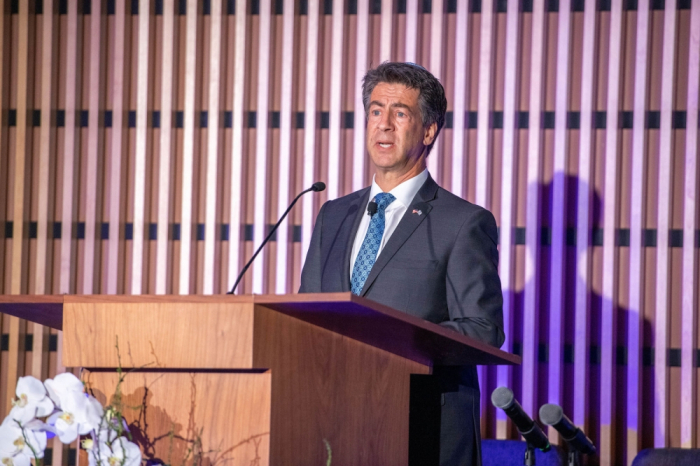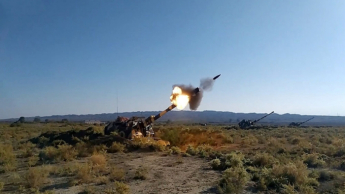Rabbi Ron Li-Paz: Azerbaijan and Israel are committed friends and collaborators - EXCLUSİVE İNTERVİEW

Baku Tribune presents an interview with Rabbi Ron Li-Paz, the Vice President of the Center for Interreligious Understanding (CIUnow.org) and the Senior Rabbi of Valley Outreach Synagogue (vosla.org) in Calabasas, California.
Baku Tribune presents an interview with Rabbi Ron Li-Paz, the Vice President of the Center for Interreligious Understanding (CIUnow.org) and the Senior Rabbi of Valley Outreach Synagogue (vosla.org) in Calabasas, California.
- Under Donald Trump, as you know, the issue of anti-Semitism was given priority. Trump signed an executive order to combat anti-Semitism, although not all Jews in the United States approved of this executive order. How do you assess the level of anti-Semitism in the US today? What has changed in Jewish life since Joe Biden came to power?
- It would be easy to attribute the current rise of antisemitism to particular political or public figures or its decline to others, but in reality, while heads of state can set the tenor for the countries they lead (and they certainly do), societies have dynamics within them that give rise to hatred and bigotry. The oldest, most entrenched hatred is antisemitism. It's reflexive. When does it rise? During challenging times. When people are under-employed, unemployed or struggling to pay for household goods, some jump to conclusions that the "Other" in their society is to blame. It's far easier than being reflective and searching for truth. We Jews have historically been that "Other" in almost every society in which we have lived; Israel, of course, being the rare exception. We only need to look at the vast availability of fraudulent historical documents such as the Protocols of the Elders of Zion to see that people will accept false and malicious propaganda about Jews as truth and demonize Jewish people on the basis of gross and heinous lies.
- By the way, recently Donald Trump said that American Jews should "pull themselves together" and support him more than the current unenviable polls of Jewish voters show. Although he has been a staunch ally of Israel during his four years in the White House, he says, "great evangelicals appreciate it much more than people of the Jewish faith, especially those who live in the US." What do you see as the reasons for such a different approach to Trump - evangelicals support Trump, while those of the Jewish faith do not recognize him?
- Ideologically, Evangelical Christians align with Conservative political leaders and values, so Trump made sense to Evangelicals. Ideologically, they didn't see a better candidate on the ballot. Jews, who span from profoundly liberal to deeply conservative (religiously and politically) didn't necessarily align with Trump on Israel or anything else. For many, his personal behaviors and statements sent many Jews running in the opposite direction even if they agreed with certain Trump policies. Had a Democratic president or even a different Republican one opened the embassy in Jerusalem, I imagine that they would have had enormous support from Jewish America.
There is an additional issue though that needs to be taken into account when we look at Jewish and Liberal distancing from Israel in these recent years. It isn't only American political leaders and policy. It's the university campus. The doctrine on most American campuses is loudly anti-religious and anti-Israel. That is having an enormous impact on younger voters and younger Americans in general.
- Which US states are experiencing an increase in anti-Semitic hate crimes? And what methods of struggle are being adopted to reduce the incidence of anti-Semitism?
- I don't have the statistical data to make a statement in answer to this question, but I urge readers to visit the website, Wiesenthal.com (Simon Wiesenthal Center) or ADL.org (Anti-Defamation League) for accurate information and valuable insights.
- You have visited Azerbaijan more than once and are intimately familiar with the lives of Jews in this country. What do you know about the life of Jews in Azerbaijan?
- I want to respect the fact that offering a single-story impression of an entire complex society never does it justice. I have spent time in Baku, Kuba and several cities of Karabah. My interactions with people in every one of these places has been consistently positive, welcoming and warm. Fascinating, in fact. My sense is that Azerbaijanis, many of whom maintain contact with me via social media, are very proud of their country and its leadership. I have to tell you that when I last flew out of Baku in the direction of home, I wanted to return and to introduce Azerbaijan to my family in the future.
- You know that in Azerbaijan all members of the national minority, including Jews, are treated with respect. That is, Azerbaijan continues to observe the traditions of tolerance and multiculturalism. What is the uniqueness of the Azerbaijani model of multiculturalism, in your opinion?
- As I have said numerous times in television interviews, I think the Azerbaijani model of multiculturalism, not merely in name but in practice, is unique and needs to be examined by other nations. I think this is a credit to your national leader, President Aliyev. He sets the tone for the culture of the society and his reinforcement of the importance of tolerance and multiculturalism is profound, and to my mind, effective. I also know that members of the government and the Center for Multiculturalism are working hard to ensure that these laudable values are parts of the education offered to children and adults alike. That's essential if these values are to remain Azerbaijani for future generations.
- It has recently become known that intensive negotiations are underway to open an Azerbaijani embassy in Israel. As you know, Azerbaijani-Israeli relations today are developing along an ascending line even without the Azerbaijani embassy in Israel - this is in the field of security and defense, in the field of energy, in the field of tourism and trade. I will even add that the high level of relations that exists today between the two countries is not in Israel with those countries where there is an Israeli embassy. What else, in your opinion, will the opening of the Azerbaijani embassy in Israel change in bilateral relations? Where else should the two countries move after the Azerbaijani embassy opens?
- The last time I was in Tel Aviv with the Azerbaijani Touristic Representative, Jamilya Talibzadeh, we talked about the absence of an embassy. Of course, we could both foresee that the establishment of such a significant diplomatic station was on the cards. It was a matter of time. The relations between Azerbaijan and Israel have only been growing. I know from Jamilya that tourism between the two countries is on the increase which only benefits people-to-people relationships.
I expect that we will soon find Azerbaijani foods in Tel Aviv grocery stores and delicious Israeli foods in Baku. There is no limit to what can be exchanged from fine art to music, theater, manufactured goods, energy, energy technology, as well as groundbreaking advances in science and healthcare. Looking at the geo-political realities of the present day, I feel more secure knowing that Azerbaijan and Israel are committed friends and collaborators.
Interviewed by Seymur Mammadov
The Rocket and Artillery formations of the Azerbaijan Army conduct live-fire exercises in accordance with the combat training plan for 2021, the Ministry of Defense of Azerbaijan told Baku Tribune.
LAST NEWS






.jpg&h=67&w=67&zc=1&q=100)













